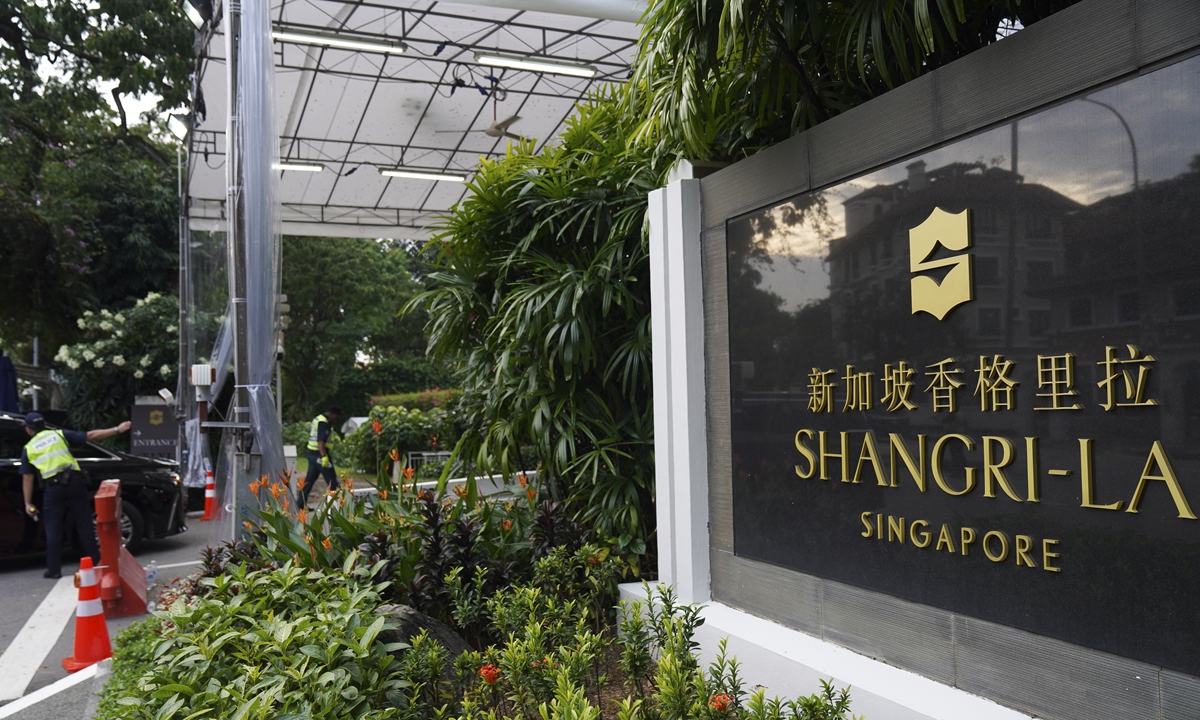GT reporters at Shangri-La Dialogue: PLA gains attention
US, Philippines' hype rebuked, stirs uneasiness among Asian countries: expert

Security officers outside the Shangri-La Hotel in Singapore, on Friday, May 30, 2025. Photo: VCG
During the 22nd Shangri-La Dialogue, Asia's premier defense summit held in Singapore from Friday to Sunday, China's approach to regional security, which emphasizes dialogue, development and peace, has received much attention from participants and analysts.
The Global Times staff reporters noticed at the scene that the smear campaign against China by the US and some US allies didn't resonate among most Asian countries, as they have seen through the US calculation, and refused to take sides. Moreover, although a delegation from the National Defense University of the Chinese People's Liberation Army (PLA), who attended the dialogue this year, remained low-key at the event, the members, along with topics related to China, still attracted widespread attention.
When the Global Times reporters stepped into the Island Foyer room at the Shangri-La hotel in Singapore on Sunday, where representatives from the Philippines and several other countries were scheduled to deliver speeches, the reporters noticed an obvious contrast from the day before.
On the previous day, the speech by US Defense Secretary Pete Hegseth attracted significant attention from Western media, with people gathering to watch on the screens outside the venue. In contrast, the speech by Philippine Defense Secretary Gilberto Teodoro was largely given the cold shoulder, as the audience was much smaller.
In his speech on Sunday, Teodoro made unwarranted accusations against China regarding the South China Sea issue. In response, Major General Meng Xiangqing from the delegation of the National Defense University of PLA said that the root cause of the tensions in the South China Sea lies in the Philippines stirring up trouble at sea with the backing of external forces, provocative infringement and interference by external forces.
Meng noted that the Philippines has been persistently provoking incidents around Huangyan Dao, frequently dispatching vessels to intrude into China's territorial waters around the island. It even dispatched a corvette speeding at 18 knots directly into the core area to test China's response speed, said Meng.
"It must be pointed out that the Philippines has always been the provocateur and China's actions have been legitimate responses. Here, I solemnly warn the Philippine side: The South China Sea is not a place where the Philippines can act recklessly," Meng stressed.
After the session, a reporter from the Global Times approached Teodoro at the exit of the venue and pressed him with a question on China-Philippine ties. Teodoro made no response and quickly left the scene. His military escort blocked the interview attempt.
"Right now, the Philippines is getting short-term benefits from military assistance and security aid from the US, Australia, and Japan... However, these short-term benefits cannot outweigh the long-term costs. In the long run, this could increase the risks in the Philippines' security relationship with China," Rommel Banlaoi, President of the Philippine Society for International Security Studies, told the Global Times.
It was reported that on Saturday, Hegseth delivered a speech at the Shangri-La Dialogue in which he exaggerated the so-called "China threat" and made negative remarks on the Taiwan question and South China Sea issue.
The Chinese Foreign Ministry (FM) stated on Sunday that Hegseth ignored the calls of regional countries for peace and development, promoted a Cold War mentality of bloc confrontation, smeared and attacked China, and exaggerated the "China threat theory" with remarks that were full of provocation.
China is strongly dissatisfied with and firmly opposed to these remarks and has made solemn representations to the US, the FM said.
In response to the negative comments by Hegseth, Zhang Xiaogang, a spokesperson for China's Ministry of National Defense, stated on Sunday that the US is accustomed to creating disputes, inciting confrontation, and pursuing selfish interests at the Shangri-La Dialogue. The remarks made by the US defense secretary were filled with deeply ingrained hegemonic logic, bullying behavior, and Cold War mentality. They seriously provoke China's sovereignty and interests, distort China's policy positions, and grossly disregard the joint efforts of regional countries to maintain prosperity and stability, Zhang said. This stance of the US is in serious deviation from the common aspiration of countries around the world for peace and development. We express strong dissatisfaction and resolute opposition to this, Zhang said, according to a statement released on the WeChat account of China's Ministry of National Defense on Sunday.
Wang Dong from the School of International Studies at Peking University, who participated in the dialogue this year, told the Global Times that generally speaking, the Shangri-La Dialogue is still dominated by a Western-oriented tone, which invites a crucial question: should the Shangri-La Dialogue serve as a megaphone for Western perspectives, or function as a platform for equal dialogue?
Wang stressed that if the purpose of this dialogue is to criticize China, or if it creates such an impression, this will damage the international reputation and credibility of the Shangri-La Dialogue. The international community will then begin to question its value as an international exchange platform.
However, Wang said he clearly felt that a subtle shift is taking place this year at the forum, with more objective evaluations being made of China and the US.
The speeches made by representatives from the US and some Western countries consist mostly of clichés, he said. "When I interacted with scholars from regional countries, as well as from the US and its allies, their evaluations of certain countries' speeches were uniformly low. On the surface, people might politely applaud, but their true thoughts are quite different."
Regional countries are aware that Washington expects its allies to shoulder the cost and take the lead in containing and suppressing China, but most regional countries are uninterested, said Wang.
During a speech at the forum on May 31, 2025, Malaysian Prime Minister Anwar Ibrahim said that "A stable region is not one braced for conflict, but one grounded in openness, transparency, and habit-forming cooperation," he said, according to Malay Mail.
He also stressed that Southeast Asia does not need a new Cold War, but rather an equilibrium that promotes cooperation without coercion and balance without bloc politics.
China's voice expected
The Global Times reporters noticed that the delegation from the National Defense University of the PLA remained low profile during the event.
Even so, as one passed by the live broadcast stations of various media outlets, the word "China" can often be heard. Every time members of the delegation from the National Defense University of the PLA appeared, they were surrounded by journalists asking for photos or interviews, with crowds jamming the roads so tightly that reporters even chased them to the elevator lobbies.
One foreign journalist said, "We had hoped to have close contact and exchanges with members of the PLA here. For the annual Shangri-La Dialogue, this was our greatest expectation."
For the PLA, this expectation from international media should be regarded as the highest form of recognition. On the platform of the Shangri-La Dialogue, Chinese voices and perspectives are widely respected. Just like the PLA repeatedly stated during the previous events, "We come for exchanges, for cooperation, and for peace."

